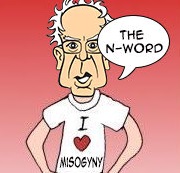(Thread IKs:
dead gay comedy forums)
|
As far as I know about Georgism it's not wrong. It's just also not Correct.
|
|
|
|

|
| # ? Apr 30, 2024 06:50 |
|
partial credit.
|
|
|
|
I need to explain commodity fetishism to some people, and I want to make sure my own understanding of it is in order, more or less. By way of disclaimer, I'm new to thinking about this, so there may well be errors in the below description. It's one of those concepts which I've heard from different angles over the years and never quite grasped how I was supposed to align those different angles. What I type below is my current understanding, and is partially just a practice attempt for me to type it out. However, if I have anything glaringly wrong feel free to point errors out. Thanks to money, the god of commodities, there is a false equivalence between different commodities which are, outside of this social relation, actually not comparable in value. This helps to create an almost religious aspect to 'the commodity' as a thing, and thus to each indiviual commodity. One major effect of this is that the actual social relations involved in production (let's say the harvesting of sugarcane, the synthesisation of caffeine, the production of cans, all involved in the production of a can of coca cola) become invisible to me because I see only the commodity (i.e. the can of coke). Any exploitation, alienation, environmental degradation, child labour, slavery that may have happened in the production of the drink is concealed and legalised at the moment of purchase, because look, it's a can of coke! Can I also use commodity fetishism to explain why people will pay more for this can of coke than a cheaper, supermarket's own brand of coke, even though they are made of the same ingredients? Because I am invested in the fetishisation of commodities, and because I see them as either a) satisfying some desire I have or b) saying something about myself that I want to say (or probably both of these at once?), I pay the extra money for the pretty much identical commodity. Another question, where does this sit with the branding and advertising of coke? Should I include the work that has gone into the creation of their brand, through advertising design but also the physical work of, for eample, erecting billboards? Where does the balance sit between 'the additional value comes from fetishising the commodity' and 'the additional value comes from the labour time put into making the brand', or is it just 'both'? I hope this makes some kind of sense to people who aren't me.
|
|
|
|
crazyvanman posted:I need to explain commodity fetishism to some people, and I want to make sure my own understanding of it is in order, more or less. By way of disclaimer, I'm new to thinking about this, so there may well be errors in the below description. It's one of those concepts which I've heard from different angles over the years and never quite grasped how I was supposed to align those different angles. What I type below is my current understanding, and is partially just a practice attempt for me to type it out. However, if I have anything glaringly wrong feel free to point errors out. Depending on your audience that could be a pretty serviceable explanation. People are generally confused by the term because they think of fetishism in regards to the sexual term rather than the religious one, but I dunno if your audience is going to be receptive to a quick explanation of what a religious fetish is. crazyvanman posted:Can I also use commodity fetishism to explain why people will pay more for this can of coke than a cheaper, supermarket's own brand of coke, even though they are made of the same ingredients? Because I am invested in the fetishisation of commodities, and because I see them as either a) satisfying some desire I have or b) saying something about myself that I want to say (or probably both of these at once?), I pay the extra money for the pretty much identical commodity. I wouldn't generally use commodity fetishism to explain branding because I think of that as a more complex social function that isn't directly a result of commodity fetishism but as a result of cultural and social structures created by the marketing team (ostensibly). Commodity fetishism is a part of the foundation of what makes it work but I don't think of it as being a direct line between the two. The labor put in to the thing to create the brand is more significant to me for creating the value of the brand because commodity fetishism isn't being applied specifically to that object, but to all objects in the market and makes for kind of a foundation for how people view things they purchase. Wallace Shawn's quote on it is evergreen, you may find inspiration within: quote:"One day there was an anonymous present sitting on my doorstep—Volume One of Capital by Karl Marx, in a brown paper bag. A joke? Serious? And who had sent it? I never found out. Late that night, naked in bed, I leafed through it. The beginning was impenetrable, I couldn't understand it, but when I came to the part about the lives of the workers—the coal miners, the child laborers—I could feel myself suddenly breathing more slowly. How angry he was. Page after page. Then I turned back to an earlier section, and I came to a phrase that I'd heard before, a strange, upsetting, sort of ugly phrase: this was the section on "commodity fetishism," "the fetishism of commodities." I wanted to understand that weird-sounding phrase, but I could tell that, to understand it, your whole life would probably have to change. It's a big concept but I've always found it most potent of a concept in explaining people's separation from the processes of labor that create the things they purchase, rather than trying to explain the exact numerical value of the price and to what degree it's been inflated.
|
|
|
|
crazyvanman posted:I need to explain commodity fetishism to some people, and I want to make sure my own understanding of it is in order, more or less. By way of disclaimer, I'm new to thinking about this, so there may well be errors in the below description. It's one of those concepts which I've heard from different angles over the years and never quite grasped how I was supposed to align those different angles. What I type below is my current understanding, and is partially just a practice attempt for me to type it out. However, if I have anything glaringly wrong feel free to point errors out. i'd shy away from calling the equivalence false, because it may well be (temporarily, contingently) true that the summed human labor required to manufacture one can of coke really is approximately double that required to manufacture three packets of crackers or whatever (i didn't look up prices before writing this). however, the fact that that mathematical proportion in human labor has created a mathematical proportion in market price is obscured, and we start to think of the coke as simply three times better or more special or something than the crackers because of some essential goodness within it, and naturally and immediately begin performing ritualistic behavior (such as typing at a keyboard, exchanging tokens with a cashier...) to obtain the coke
|
|
|
|
Both really helpful, thank you. Without wanting to flog a dead horse, but because the wider context is that I want to show a Marxist approach to understanding commodities and advertising (at a fairly basic level, I should add)... I understand that trying to quantify the contribution that fetishising commodities makes to the value of a particular commodity was naive. Can I instead see the world of branding and advertising as religious rituals that help to imbue the commodity with its magical properties? So they are manifestations of the fetishisation and worship. Shows like 'Dragons' Den' and 'The Apprentice' take on the role of the old miracle plays, teaching the good capitalist moral tales of the free market. I don't want to stretch the one idea too far, but I like exploring the edges and seeing where the limits are.
|
|
|
|
It depends on your audience, I wouldn't try to extend that metaphor in a disciplined marxist setting. If you're speaking to someone with whom you can afford ideological play then I could see the possible benefit, but if you're speaking to someone more likely to take an academic or scientific approach you'd likely lose ground through a loose metaphor like that. I'd avoid presenting such a thing as theory rather than play for worry of mixing the two in the reception of the audience. I can't speak to the efficacy of metaphor and thought play without a basis in theory and materialism because I learned those things first, but they can be enjoyable and productive with an audience that's already going to be a bit on board with you. https://www.youtube.com/watch?v=yuBe93FMiJc Network is a great movie by the way. Flournival Dixon has issued a correction as of 16:29 on Apr 11, 2024 |
|
|
|
crazyvanman posted:Both really helpful, thank you. I don't know your audience but this, to me, does seem like stretching it pretty far. Marx is using "fetishization" here in the sense that commodities are imbued with properties and meaning above and beyond what they literally are in a material sense, not so much in that they become actual objects of worship or become eg. godly vessels. You're right in that branding and advertisement do redound to the fetishization of commodities and that capitalized media does reproduce its own philosophical and social bases but to explicitly paint it with religiosity (besides feeling a little crimethincesque corny) I think detracts from the fact that these are emergent behaviors from a system extant in material reality. Capital, by its nature, is going to produce structures that fetishize commodities, and these structures are going to exist on capital's terms. Pointing to advertising executives as High Priests of Commodity Fetishization is certainly poetic, but I don't know if it's particularly useful as an explanatory vehicle.
|
|
|
|
I think marketing labor serves as a useful analogy to understanding commodity fetishism of productive labor
|
|
|
|
Start from the can of Coke and the marketing and then take the marketing away and talk about the two cans of soda that are otherwise identical
|
|
|
|
bear in mind that the essence of commodity fetishism is that the alleged magic property of commodities is that they make their own value detached from the labor that actually creates their value
|
|
|
|
commodity fetishism gets confused with conspicuous consumption because of the word and the association with psychology, which trips up that understanding
|
|
|
|
commodity fetishism is just not a good term because the language has drifted and fetish means horny in leather now.
|
|
|
|
people shy away from dictatorship of the proletariat but that doesn't make it any less righteous a notion. liberalism has lost all meaning in american usage but is still a necessary concept. I mean I guess you could say commodity statues of daedalus but that would confuse people more than saying fetishism e: commodity automaton, the commaton The Voice of Labor has issued a correction as of 05:27 on Apr 12, 2024 |
|
|
|
yeah I don't know what else to call it so I usually just describe the phenomenon without naming it because it only serves to confuse.
|
|
|
|
Zodium posted:commodity fetishism is just not a good term because the language has drifted and fetish means horny in leather now. commodity worship or community idolization would a less horny way of saying that now.
|
|
|
|
Thanks again, all, lots of helpful explanation and distinction. I remember seeing Terry Eagleton speak years ago and him saying that his favourite examples of commodity fetishism is that the stock market section on the news appears just after, and in much the same way as, the weather forecast. I never quite got that but I do now.
|
|
|
|
Tankbuster posted:commodity worship or community idolization would a less horny way of saying that now. That still invokes ideas of conspicuous consumption more than it does essentializing commodity value.
|
|
|
|
ive never felt like ive really had a good understanding of “commodity fetishism” tbh, its one of those things ive been meaning to re-read someday
|
|
|
|
dead gay comedy forums posted:https://twitter.com/b1g_damage/status/1300210161773092866
|
|
|
|
the Wallace Shawn bit is basically the gold standard, to my mind. commodity fetishism is difficult to capture in a term because the notion it conveys is an entirely different way of perceiving the world, so you have to describe the world so perceived. use value has a bit of the same problem going on. I have had some success using the language of affordances instead there, though it is also very cumbersome. "a coat affords putting-on" is basically an improvement only in terms of getting away from "value," but at least makes clear that an anti-coat makes no sense. Zodium has issued a correction as of 16:49 on Apr 12, 2024 |
|
|
|
I'm honestly surprised these are apparently such difficult terms to grasp because they seem real intuitive to me. To the point where I can't quite imagine what exactly some of yous are having difficulty with so I can't really try to explain it either. Makes me question if my friends ever actually understood when I tried to explain it to them cus it makes it real likely my explanation sucked.
|
|
|
|
Orange Devil posted:I'm honestly surprised these are apparently such difficult terms to grasp because they seem real intuitive to me. To the point where I can't quite imagine what exactly some of yous are having difficulty with so I can't really try to explain it either. Makes me question if my friends ever actually understood when I tried to explain it to them cus it makes it real likely my explanation sucked. the problem is that once you understand them, you can't easily know what it's like to not understand them. it's like the fedex arrow, once you see it, you have no ability to unsee it
|
|
|
|
Zodium posted:but at least makes clear that an anti-coat makes no sense. I'm gonna go ahead and defend the anticoat. if you look at use value as an average of the total and you consider it to be subjective, there are definitely things that have an overall negative use value. missiles and bombs fail the hedonistic calculus. they have a use value for the bombers only in the extremely abstract way of securing and maintaining favorable trading conditions against the bombed. bombs have a solid tangible material negative use value for the bombed, they destroy infrastructure, wreck agriculture, generally squander and despoil stored labor and make life harder. so there are extant real material things that suck up labor and resources to produce something that decreases the overall utility people get
|
|
|
|
The Voice of Labor posted:missiles and bombs back when david harvey was still casting pods he used to talk about military expenditures as surplus destruction. in 1991 is was the so-called peace dividend. in 2024 it is why americans don’t have free healthcare. different meme, same outcome: capitalists would rather literally destroy social surplus than put it to socially beneficial uses
|
|
|
|
The Voice of Labor posted:I'm gonna go ahead and defend the anticoat. if you look at use value as an average of the total and you consider it to be subjective, there are definitely things that have an overall negative use value. missiles and bombs fail the hedonistic calculus. they have a use value for the bombers only in the extremely abstract way of securing and maintaining favorable trading conditions against the bombed. bombs have a solid tangible material negative use value for the bombed, they destroy infrastructure, wreck agriculture, generally squander and despoil stored labor and make life harder. so there are extant real material things that suck up labor and resources to produce something that decreases the overall utility people get it doesn't work like that because weapons do realize their purpose in utilization, thus use-value "overall utility" is something that does not fit here (and the whole utilitarian approach in general w/r/t marxism)
|
|
|
|
The Voice of Labor posted:I'm gonna go ahead and defend the anticoat. if you look at use value as an average of the total and you consider it to be subjective, there are definitely things that have an overall negative use value. missiles and bombs fail the hedonistic calculus. they have a use value for the bombers only in the extremely abstract way of securing and maintaining favorable trading conditions against the bombed. bombs have a solid tangible material negative use value for the bombed, they destroy infrastructure, wreck agriculture, generally squander and despoil stored labor and make life harder. so there are extant real material things that suck up labor and resources to produce something that decreases the overall utility people get there is nothing abstract about securing and maintaining favorable trading conditions against the bombed. dead gay comedy forums posted:it doesn't work like that because weapons do realize their purpose in utilization, thus use-value yes. this is exactly why i prefer the language of affordances.
|
|
|
|
socially necessary labor is taken as an average. exchange value is taken as an average. it's a weird double standard to only look at use value atomically
|
|
|
|
i'm fetishizing the anti-coat. i'm alienated from its lifecycle. the anti-labor involved in the production of such a thing is a complete abstraction, to me
|
|
|
|
Someone summoned the anti coat?!? Starting off with a missile and "negative" value. This isn't at all what I was going for. Marx, capitalists, are both cool with consumable products existing. Anti coat is in refence only to use value. If something can have a use value, then something without a use value must exist. So if a coat exists, that same linnen must be able to be arranged into an item with no use value, or "anti coat". This entire argument is just a translation abuse by me*. If we use a more appropriate "value in use" translation, then it's more clear. Is there a value in using this item? A hammer can be used as a hammer. A broken hammer can not be used as a hammer. There is value in using a hammer. There is not value in using a broken hammer.
|
|
|
|
Wallace Shawn was in the ISO back when it existed, so the fact that he can articulate commodity fetishism is no surprise
|
|
|
|
BillsPhoenix posted:Someone summoned the anti coat?!? are you talking about art?
|
|
|
|
BillsPhoenix posted:This entire argument is just a translation abuse by me*. If we use a more appropriate "value in use" then it's more clear. Is there a value in using this item? A hammer can be used as a hammer. A broken hammer can not be used as a hammer. There is value in using a hammer. There is not value in using a broken hammer. bill understands affordances (laudatory). a hammer is a hammer because it affords a certain opportunity for action for an organism with the necessary capabilities for action (effectivities). a broken hammer does not afford the opportunity to hammer, just as a working hammer does not to an organism with no grasping or swinging effectivities either. use-values are relations between animal and environment. thus, there cannot be "negative" use value in the sense there can be negative exchange value, nor such a thing as an anti-hammer, but because "value" has become inextricably intertwined with utilitarian value, it easily becomes confusing.
|
|
|
|
How many yards of linen makes one wizard hat
|
|
|
|
Marenghi posted:How many yards of linen makes one wizard hat About 1 and a half
|
|
|
|
the anti-coat is a cool idea.
|
|
|
|
Bombs have an anti-exchange value obviously
|
|
|
|
Tankbuster posted:the anti-coat is a cool idea. guys who are wrong in just the right way have incredible use value
|
|
|
|
douglas dowd (who is a veblenist rather than a marxist) had an interesting point of military goods/military keynesianism being an economic dead end because while building bombs et al themselves will have an economic growth effect, the bombs themselves dont contribute to future economic growth unlike say a school or a highway
|
|
|
|

|
| # ? Apr 30, 2024 06:50 |
|
Raskolnikov38 posted:douglas dowd (who is a veblenist rather than a marxist) had an interesting point of military goods/military keynesianism being an economic dead end because while building bombs et al themselves will have an economic growth effect, the bombs themselves dont contribute to future economic growth unlike say a school or a highway this is because some opportunities for action (affordances) afford fashioning new affordances. I can use a hammer and wood to fashion a table, which affords putting stuff on it, and thus grows the set of available affordances for the organism in the ecosystem (the niche), but I can also use it to hit you in the head, which does not.
|
|
|
























